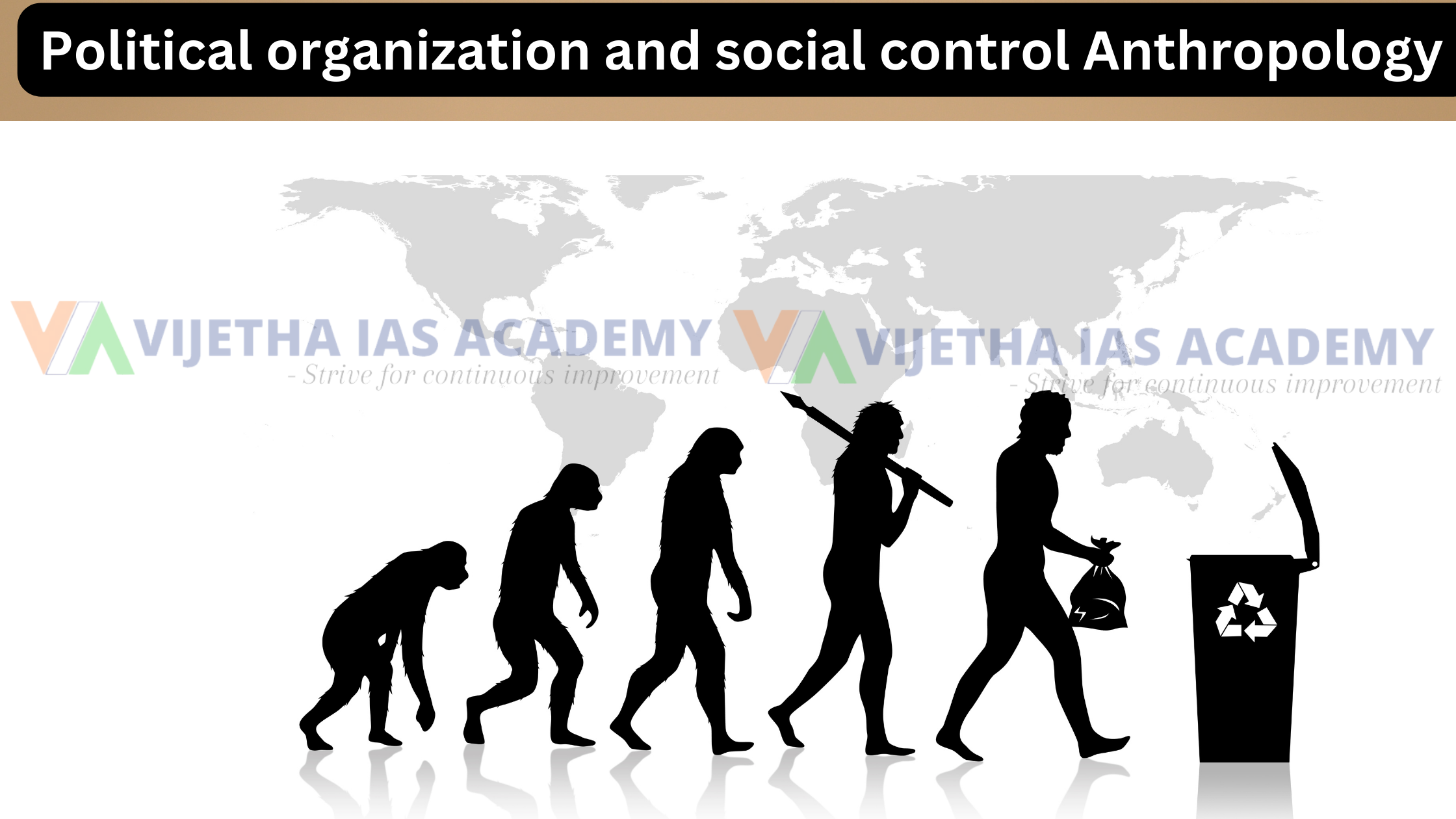
Political Organization and Social Control in Anthropology: A Key for UPSC Aspirants
When preparing for the UPSC exam, particularly with Anthropology as an optional subject, understanding the intricacies of political organization and social control becomes crucial. These concepts are not only pivotal for scoring well in the exam but also offer profound insights into the fabric of human societies. For aspirants, enrolling in specialized courses like those offered by Vijetha IAS Academy can be a game-changer. Under the guidance of experts like Kishore sir, Anthropology can become one of the strongest pillars of your UPSC preparation.
Understanding Political Organization in Anthropology
Political organization in anthropology refers to the ways in which societies create and maintain social order and address conflicts. It encompasses various forms of governance and leadership, from the simplest bands and tribes to complex states and empires. Here's a breakdown of the primary types of political organizations:
1. Bands
Bands are the simplest form of political organization, typically found in nomadic societies of hunter-gatherers. They consist of small, kin-based groups with fluid membership. Leadership is informal, often based on age, wisdom, and consensus rather than formalized authority.
2. Tribes
Tribes are larger than bands and usually consist of several kin groups. They have more defined leadership structures, often with a council of elders or chiefs who make decisions for the group. Tribes engage in subsistence farming or pastoralism and have more permanent settlements compared to bands.
3. Chiefdoms
Chiefdoms are more complex and hierarchical, with a clear, central authority figure – the chief. The chief's position is usually hereditary, and they control resources, labor, and religious rituals. Chiefdoms are marked by social stratification and a more organized economy.
4. States
States represent the most complex form of political organization. They have a centralized government, codified laws, and a bureaucracy to enforce rules and policies. States can control large territories and populations, and they engage in intensive agriculture, trade, and warfare.
Understanding these forms helps in appreciating the diversity of human societies and the evolutionary trajectory of political systems.
Social Control Mechanisms
Social control refers to the mechanisms a society uses to regulate individual and group behavior, ensuring conformity and compliance to established norms and rules. This concept is vital in anthropology as it reveals how order is maintained in different cultural contexts. Social control can be formal or informal:
Informal Social Control
Informal social control includes customs, traditions, norms, and social expectations that guide behavior. These mechanisms are enforced through socialization processes, peer pressure, and community surveillance. Examples include:
- Gossip and Ostracism: Used to enforce social norms by creating fear of social exclusion.
- Rituals and Ceremonies: Reinforce community values and collective identity.
- Public Opinion: Acts as a powerful tool to regulate behavior without formal sanctions.
Formal Social Control
Formal social control involves codified laws and regulations enforced by recognized authorities. This includes:
- Legal Systems: Courts, police, and correctional institutions that enforce laws and deliver justice.
- Bureaucracy: Administrative bodies that implement rules and policies.
- Education Systems: Formal institutions that instill societal values and norms.
Relevance to UPSC Aspirants
For UPSC aspirants, mastering these concepts is crucial not only for the anthropology optional paper but also for the general studies paper and essay writing. Here's how understanding political organization and social control can aid your preparation:
Analytical Skills
Analyzing different forms of political organization and social control mechanisms sharpens your analytical skills. You learn to compare and contrast various societal structures and understand their strengths and weaknesses, which is a valuable skill for the UPSC exam.
Essay Writing
The ability to discuss political and social structures in a coherent and insightful manner enhances your essay writing skills. You can draw from anthropological examples to substantiate your arguments, making your essays more compelling.
General Studies
Knowledge of anthropology enriches your answers in the general studies papers, especially topics related to governance, social issues, and cultural diversity. It provides a broader perspective on current affairs and historical contexts.
Interview Preparation
In the interview stage, demonstrating a deep understanding of human societies and their organizational patterns can impress the interviewers. It shows that you have a holistic understanding of societal dynamics, which is essential for a future administrator.
Role of Specialized Coaching
Given the complexity and depth of anthropology, enrolling in specialized coaching programs can be immensely beneficial. Vijetha IAS Academy offers comprehensive courses tailored for UPSC aspirants. Under the expert guidance of Kishore sir, Anthropology becomes more accessible and engaging.
Benefits of Coaching with Vijetha IAS Academy
- Expert Guidance: Learn from experienced educators who provide in-depth knowledge and practical insights.
- Structured Curriculum: Follow a well-organized syllabus that covers all essential topics systematically.
- Practice Tests: Regular mock tests and practice papers to evaluate your understanding and improve your exam readiness.
- Interactive Learning: Engage in discussions, doubt-clearing sessions, and interactive classes that enhance learning.
Conclusion
Political organization and social control are foundational concepts in anthropology that offer invaluable insights into human societies. For UPSC aspirants, mastering these topics is essential for both the anthropology optional paper and the overall exam preparation. Leveraging the expertise of institutions like Vijetha IAS Academy and educators like Kishore sir can significantly boost your preparation, helping you achieve your goal of becoming a civil servant.

-1731663300970.webp)